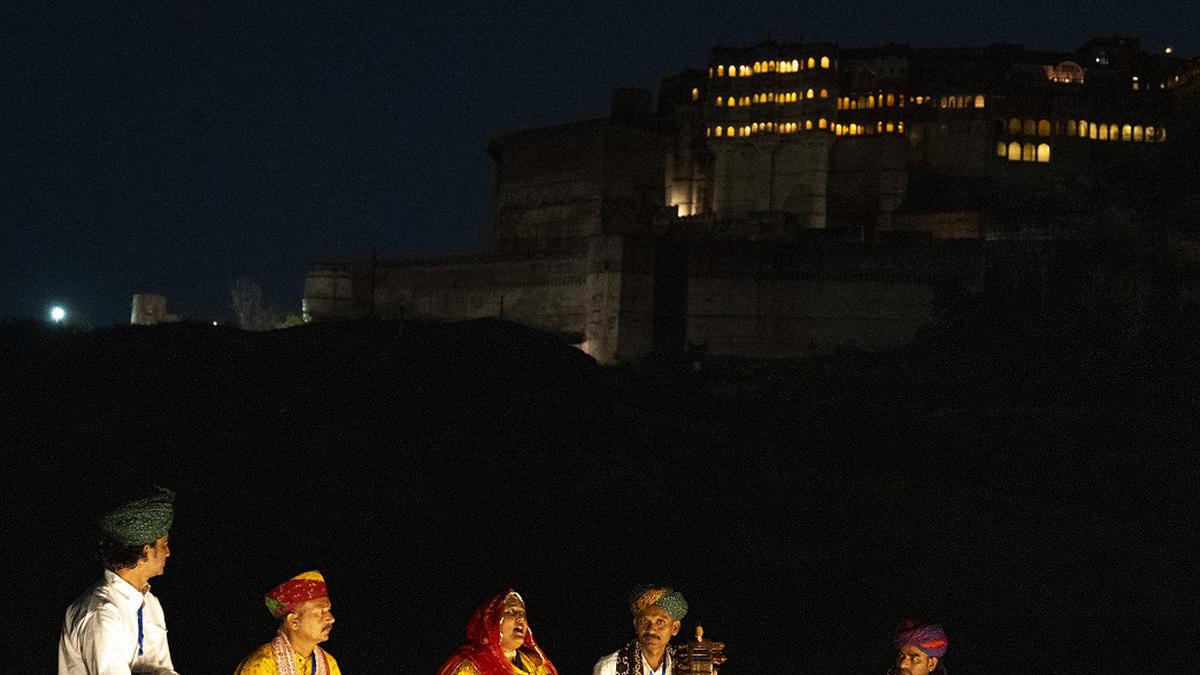
How the Jodhpur RIFF creates a level playing field for musicians
The Hindu
When the Mehrangarh Fort resonates with sounds from across the globe
A multi-course musical banquet for many palates, Jodhpur RIFF 2023 left a trail of lingering voices and images. To partake of its flavours, you needed to be willing to forego sleep, change locations (literally and metaphorically), and be moved (and humbled) in the presence of stellar arts practices channelled through professional musicians and community music practitioners from far and wide.
In its 16th year, Jodhpur RIFF has emerged as a choice destination for those seeking music across genres. With concerts planned around spectacular entries and exits by the sun and moon, the festival’s aesthetics are also defined by grand historical backdrops offered by the Mehrangarh Fort — which itself means ‘fort of the sun.’
The festival’s intent is to “reduce separation” shares festival director, Divya Bhatia, referring to the urban-rural, folk-classical, Indian-international, traditional-contemporary and other dualities that permeate the consciousness of music lovers. True to that intent, audiences were treated to performances by diverse musicians, many who have honed their art over generations, all occupying the same stage, telling their stories through song, and sometimes, through dance. Over 300 artistes from seven Indian states and seven overseas countries participated this year. It was remarkable that the festival allowed for space to reflect on how music as commerce and entertainment affects music as culture and community practice.
The inaugural session was a delicious teaser hinting at the treats in store. Women in Nauvari (Maharashtrian style nine-yard saris) wielding large drums with aplomb in Dhol Tasha (percussion band); the ringing voices of the Kalbeliya singers Mohini Devi, Sugna Devi and Asha Sapera; the dexterous khartal and dholak players from the Langa and Manganiyar communities ; sarangi and kamaicha presentations by veteran folk practitioners; Tunisian musicologist Jasser Haj Youssef’s exploratory violin tunes; the playfulness of the bhapang ensemble; the unforgettable music of Ars Nova Napoli (from Naples, Italy); the lively music of Suonno d’Ajere (also from Italy); the nimble rhythmic experiments by multi-instrumentalist Miroca Paris (from Cabo Verde and Portugal) are some echoes from the festival’s inauguration.
Among the performances, demonstrations, interactive sessions and boot camps offered over the next three days, most left the audiences asking for more. The enthralling voice of Barnali Chattopadhyay singing thumris; joyous audience participation during ‘Parampara’ (featuring ghatam maestro Vikku Vinayakram and his family of musicians); the nuanced conversations between Tarini Tripathi’s Kathak and SAZ’s Rajasthani folk tunes; the clarity of Sumitra Devi’s acoustic midnight singing in a desert park; the meeting-for-the-first-time musical notes when Asin Khan’s Sindhi Sarangi spoke to Rhys Sebastian’s saxophone; and poems of loss and pain from Navdeep Suri’s ‘Khooni Vaisakhi’ (about the Jallianwalah Bagh massacre) set to music and rendered by Harpreet were among the many imprints left by the festival.
Jodhpur RIFF’s best moments were at the dawn concerts held in Jaswant Thada, an 1899 cenotaph built in memory of Maharaja Jaswant Singh. At an elevation, the venue afforded a surround view of Jodhpur’s cityscape just before sunrise. The pre-concert soundscape included the call of azaan from mosques, chiming of the temple bells, or a film song floating up with the sound of a vehicle . The musicians were silhouettes against the remains of the night sky as you sat cross-legged on mattresses or on chairs arranged at the back. There was a sense of sacred in the air that was impossible to miss. Wiping out distractions, darkness offered conditions conducive to surrender. And if you were willing, you could be transported by music cultivated over centuries, possibly against a backdrop of divisiveness and discrimination.
The dawn concerts allowed for communion and soaking in syncretic song traditions that increasingly become more precious. They featured communities like the Meghwals and Manganiyars whose music gives faith the wholesomeness it lacks in these times of communal polarisation. Mala Ram ji and Bhallu Ram ji Meghwal, and Jalal and Barkat Manganiyar mixed magic into the morning on the first day. The second day presented mindful (and improvisatory) musical approaches by the Estonian musician duo Kuula hetke, while also offering the privilege of listening to the Alghoza, masterfully played by Idu Langa Khan. Carnatic ragas (including customary morning ragas like Bhouli) came newly alive against the backdrop of a resplendent sunrise during the concert of Mahesh Vinayakram, the next morning. Musicians Harpreet and Sharma Bandhu nudged us to see light in darkness as they evocatively relayed the poetry of Kabir, Bulleh Shah, Rahim and other spiritual practitioners in the last dawn concert.





















 Run 3 Space | Play Space Running Game
Run 3 Space | Play Space Running Game Traffic Jam 3D | Online Racing Game
Traffic Jam 3D | Online Racing Game Duck Hunt | Play Old Classic Game
Duck Hunt | Play Old Classic Game











